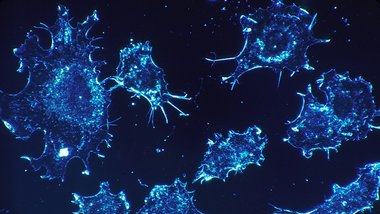27 January 2021
A study across King’s Health Partners finds people with solid tumours have the same immune response to COVID-19 as those without cancer.
A new study conducted across Guy’s and St Thomas’ and King’s College Hospital NHS Foundation Trusts shows that the immune response to COVID-19 is the same in people with solid tumours compared to those without cancer.
However, blood cancer patients varied in their ability to respond to the virus, with many unable to shake off the virus for up to 90 days after the first signs of infection – around five times longer than the average.
While potentially offering reassurance to some people with cancer, the study also highlight that patients cannot be grouped together when it comes to delivering cancer care during the pandemic.
The COVID-19 pandemic has led to many challenges for people with cancer, including decisions around shielding and delaying treatment. There is also conflicting evidence around COVID-19 having a more detrimental effect on those with cancer, and there is little insight into how cancer patients’ immune systems respond to the virus.
The study analysed the blood of 76 cancer patients: 41 of them had COVID-19, and 35 had not been exposed to the virus. The samples were compared to the blood of people who didn’t have cancer, and who had already been recruited to the COVID-IP study led by Prof Adrian Hayday, Professor of Immunobiology, King’s College London. Of the 41 people with cancer, 23 had solid tumours, and 18 had blood cancer.
Immune responses to the virus in people with solid tumours were like those of people without cancer. This was the case even where patients were in the advanced stages of cancer and were undergoing active anti-cancer treatments. Both groups were able to mount a strong immune response to the initial COVID-19 infection, and subsequently developed high levels of antibodies to clear the virus from their systems.
This study, funded by Cancer Research UK, was the first to show that high levels of COVID-19 antibodies are sustained long-term in patients with solid tumours — up to 78 days after exposure to the virus. The study also found that once patients had recovered from COVID-19, their immune systems returned to “normal”, pre-COVID functioning.
The immune response to COVID-19 in people with certain types of blood cancer was similar but “milder” in the active/early phases of the disease and became stronger over time resembling immune changes often seen in chronic infections. This was especially true for cancers affecting B cells: a type of immune cell that plays an important role in immune memory.
In patients with B cell-related blood cancers, the antibody response to the virus was more diverse compared to people with solid tumours and presented as three distinct groups:
- those who developed antibodies and cleared the virus like the solid cancer patients and people without cancer;
- those who never developed antibodies even more than 75 days after virus exposure and continued to fail to clear the virus; and finally;
- those who despite having developed antibodies against the virus were unable to clear it.
Dr Sheeba Irshad, study co-author and medical oncologist at Guy’s and St Thomas’ NHS Foundation Trust and King’s College London, said:
Whilst we need to maintain caution, our study provides some confidence and reassurance to care providers that many of our patients with solid cancers will mount a good immune response against the virus, develop antibodies that last and hopefully resume their cancer treatment as soon as possible.
These conclusions imply that many patients despite being on immunosuppressive therapies will respond satisfactorily to COVID-19 vaccines. For patients with blood cancers, especially those with B-cell malignancies, this may not hold true even in the era of COVID-19 vaccines. Our work suggests that they may be susceptible to persistent infection despite developing antibodies, so the next stage of our study will focus on monitoring their response to the vaccines. At present the best way to protect them may be to vaccinate all their carers to achieve herd immunity in the clinic.
The next phase of the SOAP study will be monitoring the immune responses of cancer patients to the COVID-19 vaccine.
To read the full article, visit the NIHR Guy’s and St Thomas’ Biomedical Research Centre website.
As a European Comprehensive Cancer Centre, the King's Health Partners Cancer Clinical Academic Group brings together world-class clinical services, research and education for the benefit of cancer patients in south east London and beyond.
Liked this article? Read about diabetic eye disease associated with five-fold risk of severe COVID-19.





